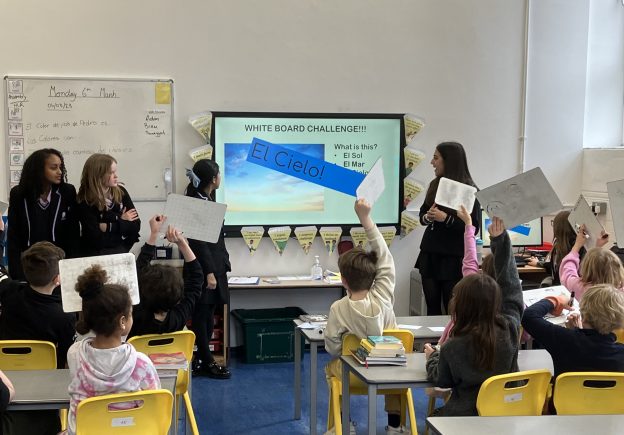Address:
William Patten Primary School
Stoke Newington Church Street
London N16 0NX
Office Manager: Rita Quigley
SENDCo: Caitlin Shaw
William Patten Primary School
Stoke Newington Church Street
London N16 0NX
Office Manager: Rita Quigley
SENDCo: Caitlin Shaw

Intent
Learning a foreign language is a liberation from insularity and provides an opening to other cultures. The 2014 National Curriculum for Modern Foreign Languages aims to ensure that all children:
A high-quality languages education should foster children’s curiosity and deepen their understanding of the world. At William Patten, we are committed to ensuring that teaching enables pupils to express their ideas and thoughts in another language and to understand and respond to its speakers, both in speech and in writing. We recognise that competence in another language enables children to interpret, create and exchange meaning within and across cultures.
At William Patten we are committed to ensuring our MFL teaching provides the foundation for learning further languages, as well as the means to access international opportunities for study and work later in life. The teaching of Spanish in EYFS, KS1 and KS2 provides an appropriate balance of spoken and written language and lays the foundations for further foreign language teaching at KS3.
Implementation
Children are introduced to Spanish in EYFS through 10 minute weekly lessons. Throughout KS1, children receive a 30-minute lesson every two weeks. This is supplemented through the use of spoken Spanish in the classroom beyond the timetabled lesson, which includes the use of Spanish to give basic instructions and refer to familiar objects in the classroom. This enables the children to develop early language acquisition skills that facilitate their understanding of the patterns of language and how these differ from, or are similar to, English. In KS2, each class has a timetabled Spanish lesson of up to 45 minutes.
Lessons across the Key Stages support the skills of speaking, listening, reading and writing:
Each new unit of work begins with a recap of the previous related knowledge from previous years. This helps children to retrieve what they have learnt in the earlier sequence of the programme of study, and ensures that new knowledge is taught in the context of previous learning to promote a shift in long term memory. Key vocabulary for the new topic is also introduced as part of this ‘unit introduction’ and children are shown the ‘Topic Vocabulary (TV) Mat. This provides definitions and accompanying visuals for each word to ensure accessibility to all. This approach also means that children are able to understand the new vocabulary when it is used in teaching and learning activities and apply it themselves when they approach their work.
Knowledge and skills in Spanish are progressive from one year to the next and are mapped across the school, in line with the BCC scheme of work. Cross curricular links have been identified and the school’s own context is considered as part of curriculum planning, including, for example, how the grounds of the school and local resources can be used to enhance and enrich Spanish learning.
Impact
Our MFL curriculum ensures that children develop their knowledge of where different languages, including the range of home languages spoken by the families of the school, as well as Spanish, are spoken in the world. Varied learning experiences, including ‘Language of the Month’ and ‘Hispanic Week’ also ensure that languages are celebrated throughout the school community whilst providing a context for language learning and develop the children’s understanding of different cultures. Innovative approaches to MFL have enabled the achievement of the British Council’s ‘International School Award’, as well as the Hackney ‘Premio Espana Primaria’ Award at Gold level. Achievement of both awards was subject to external moderation of the school’s evidence base. The school was judged to have demonstrated the achievement of each standard and met the criteria for best practice in accordance with both frameworks, both of which relate directly to the teaching and learning of Modern Foreign Languages.